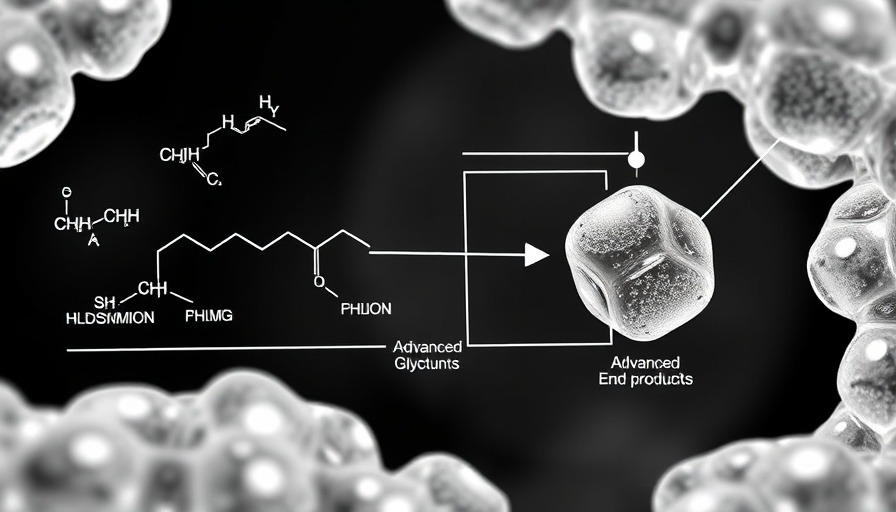
The Surprising Role of Sex in Diabetes Management
When we think about diabetes and its complications, we usually picture blood sugar levels, meal planning, and perhaps an occasional finger-pricking session. What we often overlook is the fascinating, and somewhat mind-boggling, impact of sex on the biological mechanisms involved in diabetes progression. That's where advanced glycation end products (AGEs) come into play.
Exploring Advanced Glycation End Products (AGEs)
AGEs are compounds formed when sugars stick to proteins or lipids—a process known as glycation. Unfortunately, they tend to build up in our tissues, particularly in those grappling with chronic conditions like diabetes mellitus. Research has shown that these pesky little compounds are not just innocent bystanders; they contribute to a host of complications, from eye problems to heart issues, primarily through the mechanisms of oxidative stress and inflammation.
Sex-Specific Differences in AGEs: What’s the Big Deal?
Emerging evidence reveals that men and women experience differences in the formation and effects of AGEs. Hormonal variations between sexes significantly influence how AGEs form and accumulate. For instance, women might produce lower levels of AGEs than men due to differences in estrogen. With the many roles hormones play in our bodies, it’s no surprise they extend even to the biochemical pathways that affect our health.
The Underexplored Territory: Hormones, Diet, and AGEs
When we dive deeper into dietary patterns, the plot thickens. Women’s diets tend to differ from men’s, potentially influencing AGE accumulation. For example, women may consume a higher proportion of fruits and vegetables—rich in antioxidants—which could mitigate the effects of AGEs. This is a critical piece of information as we consider how personalized nutrition plans might be catered distinctly for each gender.
Linking AGEs to Clinical Outcomes: Implications for Diabetes Treatment
Despite the wealth of knowledge surrounding the biochemical processes of AGE formation, translating these insights into clinical practice remains a daunting task. Often, medical paradigms fail to adequately address the interplay between sex differences, AGE-related pathophysiology, and individual treatment strategies. Addressing these gaps could fuel advancements in personalized diabetes management, ensuring both men and women receive tailored interventions.
Pioneering Therapeutic Approaches: The Next Frontier
Imagine if targeting AGE formation could fortify our defenses against diabetes complications. The good news is that researchers are already exploring therapeutic approaches aimed at reducing AGE accumulation and interfering with their detrimental effects via various receptor-mediated pathways. This complex yet intriguing landscape indicates a promising future where diabetes treatment not only addresses glucose levels but also the underlying biochemical anomalies—specific to women or men.
Understanding the Full Picture: Beyond Diabetes
While AGEs are a significant player in diabetes complications, their narrative doesn't end there. They are implicated in a myriad of other chronic conditions like cardiovascular diseases and neurodegenerative disorders. This broad view underscores the necessity of a diverse perspective: a singular focus on diabetes could ignore critical insights applicable to other health challenges. It reinforces the importance of cross-disciplinary research as essential for comprehensive health strategies.
Actionable Insights: Empowering Yourself with Knowledge
To optimize your health and longevity, it’s crucial to consider the molecular mechanics at play. Make dietary choices that prioritize antioxidant-rich foods to combat the effects of AGEs and don't shy away from incorporating personalized health strategies. Consult your healthcare provider for tailored advice—after all, what works for someone else might not be the best fit for you. Whether through biohacking techniques or adopting an informed lifestyle, taking proactive steps can pave the path to better health outcomes.
To Wrap It Up: The Importance of Individuality in Health
As we unravel the complexities of health and wellness, the narrative remains clear: both men and women must receive bespoke strategies tailored to their unique biological makeup. Let’s continue to push the envelope of understanding how these distinct factors influence diabetes and other health conditions. The conversation isn't just about sugary snacks or insulin levels; it’s about delving into the human body’s intricate network of sex-specific responses, granting us better insights into managing and even preventing diseases.
For those eager to seize their health journey, understanding AGEs may just be the key to unlocking profound longevity and disease prevention strategies. Start layering these insights into your lifestyle today!
 Add Row
Add Row  Add
Add 




 Add Row
Add Row  Add
Add 


Write A Comment